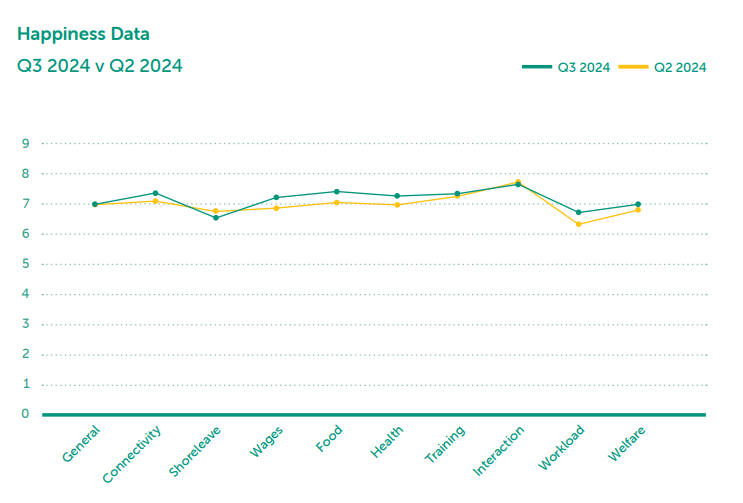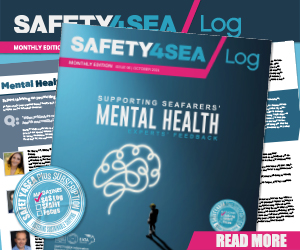The latest Seafarers Happiness Index report, based on data collected in Quarter 3 of 2024, reveals a slight increase in the overall index score to 7.16 out of 10, up from 6.99 in the previous quarter, indicating a gentle upward trend in seafarer happiness.
Overview of seafarer life at sea
While seafarers express some positives about life at sea, they continue to emphasize the need for improved support systems, recognition, respect, and rewards. Key concerns persist, including inadequate internet connectivity, which hinders communication with family, and limited shore leave, contributing to feelings of isolation and overwork. Wages remain a mixed topic, with some seafarers feeling underpaid and occasionally unpaid, while food quality is positively noted, albeit with a desire for more variety.
Fitness and fatigue management
Although fitness facilities are available, the latest findings reveal that fatigue often leads crews to prioritize rest over exercise. Additionally, there is a call for training programs that are more relevant and practical. Strong camaraderie among crew members bolsters morale, yet high stress levels related to workload and time zone challenges persist. Mixed reviews of initiatives from shore highlight the need for more effective support.
Key findings
-
General Happiness 7.05 ↑ from 7: Seafarers express overall contentment with life at sea but desire better support systems to enhance their well-being.
-
Contact with family 7.38 ↑ from 7.14: Frustration with internet connectivity remains a significant concern, especially on vessels with Starlink in restricted waters. Improved communication is seen as vital for boosting crew morale.
-
Shore leave 6.52 ↓ from 6.76: Limited shore leave opportunities are a pressing issue, with many seafarers feeling overworked and isolated, highlighting the need for better work-life balance.
-
Access to welfare facilities 6.99 ↑ from 6.8: Responses on shore initiatives are mixed, with some seafarers feeling programs are not always effective. Continuous dialogue between seafarers and shore management is essential to meet welfare needs.
-
Food 7.41 ↑ from 7.03: Feedback on food quality is generally positive, though seafarers are calling for greater variety and consideration of dietary preferences to improve their dining experience on board.
-
Ability to keep fit and healthy 7.28 ↑ from 6.99: Although fitness facilities are often available, many crew members prioritize rest over exercise, suggesting fatigue is a persistent issue. There were also reports of inadequate recreational facilities to encourage seafarers to socialize.
-
Wages 7.21 ↑ from 6.88: There are mixed feelings regarding compensation; while some seafarers feel satisfied, others express concerns about being underpaid relative to their responsibilities, indicating a need for review in pay structures. There is also growing tension about non or delayed payments.
-
Workload 6.74 ↑ from 6.32: High levels of stress related to workload were reported, particularly due to watchkeeping duties and time zone challenges, necessitating better workload management strategies. There was also concern about the removal of engineering ranks, which is negatively impacting maintenance times.
-
Training 7.36↑ from 7.28: There were some calls for more practical and applicable training that meets the real-world challenges faced at sea. Some seafarers reported feeling inadequately trained in the use and maintenance of efficiency and emissions-reducing technologies.
-
Interaction with crew 7.67 ↓ from 7.75: Strong camaraderie among crew members is a notable strength, contributing positively to overall morale and creating a supportive social environment.
-
Gains from longer transits: Extended sailing times on certain routes have unexpectedly provided some seafarers with opportunities for rest, routine establishment, and social activities, fostering a more supportive onboard environment. Senior officers are increasingly stepping in to support junior crew members, enhancing overall morale.
Unintended positive consequences of longer transits
An unexpected consequence highlighted in the latest SHI data is the impact of longer transit routes, particularly for those navigating the West African coast instead of the Red Sea. Some seafarers reported that the extended sailing time—averaging around two additional weeks—has provided them with significant benefits in terms of rest, recuperation, and overall morale.
The benefits of longer transit routes show that even small changes can have a positive impact, but there’s more to be done to ensure our crews feel supported, respected, and rewarded for their vital work. Finally, the root cause of these diversions should not be overlooked.
… said Peter Rouch, Secretary-General, The Mission to Seafarers
Establishing routine
This additional time at sea has allowed crew members to establish more structured routines, fostering a sense of normalcy amidst the demands of their work. Many seafarers have embraced opportunities for leisure activities, such as organizing barbecues and engaging in sports, which have been instrumental in enhancing camaraderie and team spirit on board.

Senior officers’ support and mentorship
Furthermore, there was feedback that the longer voyages have encouraged senior officers to take a more active role in supporting their crew. Many have been reported to step in to hold watches, allowing for a more balanced workload and enabling them to devote additional time to training and skill development for junior crew members.
Longer transit routes have unexpectedly allowed senior officers to engage more with junior crew members and this additional time at sea has enhanced camaraderie, but workload stress, especially related to watchkeeping and time zones, proves a significant challenge.
… Yves Vandenborn, Head of Loss Prevention Asia-Pacific, NorthStandard, highlighted
A positive shift in the onboard experience
One seafarer reflected positively on this shift, stating, “We have time to enjoy being at sea. It feels like a relief.” This sentiment underscores a significant shift in the work environment, transforming what could be seen as a challenge into an opportunity for growth and improved well-being among seafarers.
Implications for route planning and future structure
Findings suggest that longer transits can serve as a catalyst for enhancing seafarer satisfaction and fostering a more supportive and enriching onboard experience, pointing to the potential for structural changes in route planning.
Path to improving seafarer well-being
Furthermore, the report’s insights provide a foundation for a broader discussion on enhancing seafarer well-being and addressing the critical areas that need improvement.
The report’s emphasis on the need for improved internet connectivity and shore leave opportunities reinforces what we’re seeing across the global fleet – these fundamental aspects of crew welfare cannot be overlooked if we want to attain the highest standards in shipping.
… commented Thom Herbert, Idwal Key Account Manager and Crew Welfare Advocate, Idwal




































































